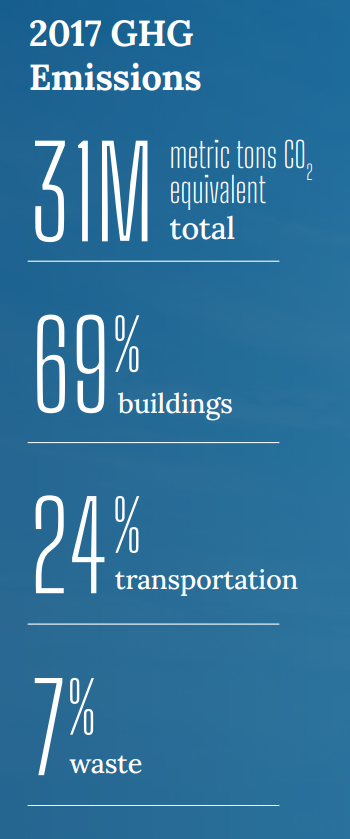Electrify Chicago
An independent tool for viewing City of Chicago building data
According to the
2022 Chicago Climate Action Plan,
69% of Chicago's emissions come from buildings, making
building emissions our biggest challenge and our biggest opportunity as a city
to tackle climate change. At Electrify Chicago, we showcase building performance using
publicly available data supplemented by community-submitted photographs and building
owners.
Start by looking at Chicago's buildings with the highest greenhouse gas intensity i.e. emissions per square foot. Large, efficient, buildings can perform much better than very inefficient small buildings on this metric.
New Article
📰 $30 Million In Missed Fines
The City Of Chicago failed to collect $30 million in potential fines from the building benchmarking ordinance, reducing transparency and accountability.
Legislative update! 🎉
As of late January 2024, legislation is being introduced to require new use more efficient forms of water and space heating, via the Clean And Affordable Buildings Ordinance (CABO), which will reduce the number of highly polluting and inefficient buildings that end up on this site.
If you're in Chicago,
write to your alderman to support the CABO!
Chicago Buildings by Greenhouse Gas Intensity
Note: Data includes large Chicago buildings with data from 2022, unless explicitly stated otherwise.
Note: This data only includes buildings whose emissions are reported
under the
Chicago Energy Benchmarking Ordinance. According to the City “As of 2016,
this list includes all commercial, institutional, and residential buildings larger than
50,000 square feet.” This dataset is also then filtered to only buildings with
reported emissions > 1,000 metric tons CO2 equivalent.
The latest year of data is from 2022, but we update the site regularly when new data is available, and some buildings may have failed to report that year, and only have older data available.
| Property Name / address | Primary Property Type |
Greenhouse Gas Intensity (kg CO2 eq./sqft) |
Total Greenhouse Emissions (metric tons CO2 eq.) |
|---|---|---|---|
|
3550 N Lake Shore Drive
3550 N Lake Shore Dr
| Multifamily Housing | 5.3 kg/sqft
Lowest 29%
| 3,625 tons
Highest 10%
|
|
The Columbian Condominium Association
1160 S Michigan Ave
| Multifamily Housing | 5.3 kg/sqft
Lowest 29%
| 2,448 tons
Highest 18%
|
|
757 Orleans at Chicago Condominium
757 N Orleans St
| Multifamily Housing | 5.3 kg/sqft
Lowest 29%
| 1,698 tons
Highest 27%
|
|
Sixty Thirty Condominium Association
6030 N Sheridan Rd
| Multifamily Housing | 5.3 kg/sqft
Lowest 29%
| 1,571 tons
Highest 30%
|
|
40 E CEDAR ST
40 E CEDAR ST
| Multifamily Housing | 5.3 kg/sqft
Lowest 29%
| 515 tons
Lowest 28%
|
|
1212 N. Wells CA
1212 N Wells St
| Multifamily Housing | 5.3 kg/sqft
Lowest 29%
| 972 tons
Highest 46%
|
|
1000 W Adams Condo Association
1000 W Adams St
| Multifamily Housing | 5.3 kg/sqft
Lowest 29%
| 986 tons
Highest 46%
|
|
Hyde Park Bank
🕰️
1515 - 1531 E 53rd St
| Office | 5.3 kg/sqft | 842 tons |
|
1783 1791 W HOWARD ST
1783 1791 W HOWARD ST
| Multifamily Housing | 5.3 kg/sqft
Lowest 29%
| 316 tons
Lowest 9%
|
|
422 424 W MELROSE ST
422 424 W MELROSE ST
| Multifamily Housing | 5.3 kg/sqft
Lowest 29%
| 876 tons
Lowest 49%
|
|
1260 Astor Building Corporation
🕰️
1260 N ASTOR ST
| Multifamily Housing | 5.3 kg/sqft | 510 tons |
|
161 W HARRISON ST
161 W HARRISON ST
| Multifamily Housing | 5.3 kg/sqft
Lowest 29%
| 888 tons
Lowest 50%
|
|
5801 5811 S DORCHESTER AVE
5801 5811 S DORCHESTER AVE
| Multifamily Housing | 5.3 kg/sqft
Lowest 29%
| 1,019 tons
Highest 44%
|
|
Midwest Orthopaedics at Rush
1611 W HARRISON ST
| Medical Office | 5.3 kg/sqft
Lowest 29%
| 1,128 tons
Highest 41%
|
|
One Superior Place
1 W Superior St
| Multifamily Housing | 5.3 kg/sqft
Lowest 29%
| 3,481 tons
Highest 11%
|
Data Source:
Chicago Energy Benchmarking Data
